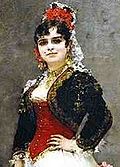Wikipedia:Today's featured article/requests/Carmen
Carmen
[edit]This nomination predates the introduction in April 2014 of article-specific subpages for nominations and has been created from the edit history of Wikipedia:Today's featured article/requests.
- The following discussion is an archived discussion of the TFAR nomination of the article below. Subsequent comments should be made on the appropriate discussion page (such as Wikipedia talk:Today's featured article/requests). Please do not modify this page unless you are renominating the article at TFAR. For renominations, please add
{{collapse top|Previous nomination}}to the top of the discussion and{{collapse bottom}}at the bottom, then complete a new {{TFAR nom}} underneath.
The result was: scheduled for Wikipedia:Today's featured article/April 6, 2013 by BencherliteTalk 15:28, 26 March 2013 (UTC)
Carmen is an opera in four acts by the French composer Georges Bizet, first performed on 3 March 1875. It was not at first particularly successful and Bizet knew nothing of its later success as he died before its initial run was concluded. The opera tells the story of the downfall of Don José, a naive soldier seduced by the fiery gypsy Carmen (first played by Célestine Galli-Marié, pictured in costume). José abandons his childhood sweetheart and deserts from his military duties, yet loses Carmen's love to the glamorous toreador Escamillo after which José kills her in a jealous rage. The depictions of proletarian life, immorality and lawlessness, and the tragic outcome, broke new ground in French opera, and after the premiere most reviews were critical. Carmen initially gained its reputation outside France, and was not revived in Paris until 1883; thereafter it rapidly acquired celebrity at home and abroad, and continues to be one of the most frequently performed operas. The music of Carmen has been widely acclaimed for its brilliance of melody, harmony, atmosphere and orchestration, and for the skill with which Bizet represented musically the emotions and suffering of his characters. (Full article...)
- Was scheduled TFA for 3 March but withdrawn by agreement. No idea of its points score, but it's ready to go. Brianboulton (talk) 11:43, 25 March 2013 (UTC)
- Support - I see Bizet was born on 25 October 1838, giving a 175th anniversary in 7 months time, if we count birth anniversaries. But perhaps no need to wait. Johnbod (talk) 14:50, 25 March 2013 (UTC)
- Comment: If there is a relevant date, perhaps we could go with a relevant date, instead of a "Nonspecific date" ?? — Cirt (talk) 15:29, 25 March 2013 (UTC)
- There is a Bizet article that would be more suitable for the anniversary, when it comes. Brianboulton (talk) 22:12, 25 March 2013 (UTC)
- Support any date, --Gerda Arendt (talk) 16:45, 25 March 2013 (UTC)
- Support any date. Great choice. - SchroCat (talk) 19:36, 25 March 2013 (UTC)

